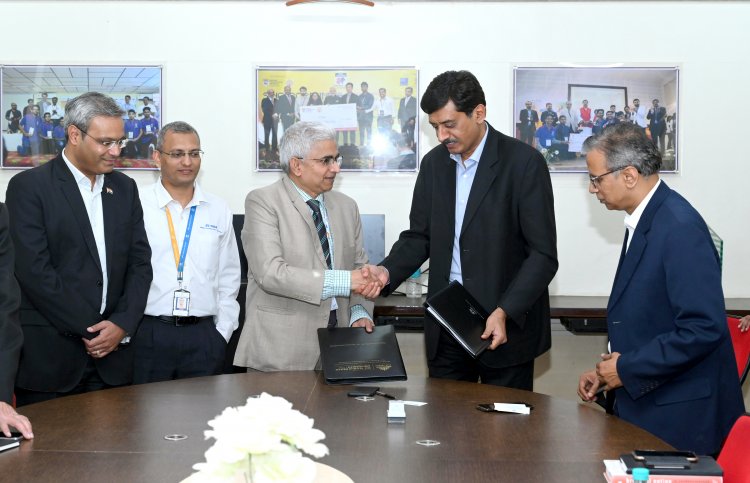MIT-WPU’s School of Engineering Updates its curriculum to bridge Industry-Academia gap

Hyderabad/ Pune: The Indian education system is frequently challenged by an obsolete curriculum that is theoretical in nature and lacks the practical element of providing skills and competencies that are important to an ever-evolving industry. In order to ensure that the curriculum is continuously updated and applicable to the industry, MIT-WPU’s Faculty of Engineering and Technology has restructured its engineering curriculum by incorporating industry-relevant courses and enabling students to choose a minor in Computer Engineering along with their BTech specialisation.
The Faculty of Engineering and Technology at MIT-WPU and CIAP believe that for India to be at the forefront of cutting-edge technology and research, it requires an evolved Industry-Academia interface. They are leading in a truly collaborative approach, which enables learning through an industrial, academic and research alliance, through its extensive industry network, state-of-the-art laboratories and centres of excellence within the campus. With this, students get opportunities to learn actual industry practices through projects and lectures instead of just theoretical learning.
Suggestions received from industries through Centre for Industry Academia Partnerships (CIAP) at the university were also considered to address the curriculum gaps. Elaborating further on this, Mr Pravin V Patil, CEO – CIAP, MIT World Peace University, said, “CIAP’s mandate is to bridge the gap between skill/exposure/academic understanding of students and his/her employability. We help bridge the gap between Industry and Academia and also build long-term partnerships with industries that can provide a win-win for both the industry and its students.”
Introduction of Four New Industry-Relevant Courses in B.Tech
MIT-WPU’s Faculty of Engineering and Technology has also undergone academic restructuring in line with the New Education Policy 2020 for incorporating skills required as per the market needs and to minimize the overlapping of courses across all the B.Tech programs. The university has identified four specific courses, which will be added to all the engineering curricula, after an intensive initiative to further update the B.Tech program and align it with the current industry demands. These four courses are as follows:
- Linux based Python Laboratory (1 Credit): This lab course is to be offered in the second year of the BTech program. At the end of this course, students will be able to use Python for problem solving.
- Basic IoT Laboratory (2 Credits): The course is to be offered in the second year of the BTech program. The course will be based on a few common lab assignments and a small discipline-specific project. This will allow students to concentrate on discipline-specific applications and also help the Schools in percolating the concepts and applications for other courses as well as in projects.
- Data Science for Engineers (2 + 1 Credits): This course is to be offered in the third year of the BTech program. The course would be a combination of theory and lab practice.
- Artificial Intelligence (AI) and Machine Learning (ML) (2 + 1 Credits): This course is to be offered in the third year of BTech program. The course would be a combination of theory and lab practice. After learning the course, students should be able to apply the AI and ML skills in their domain and projects.
- Driving Industry-Academia Collaborations: In partnership with TCS
Further, to address the growing need of engineering talent with skills in digital technology, Tata Consultancy Services (TCS), in partnership with MIT-WPU, has designed a curriculum for a 4-year undergraduate program on Computer Science called Computer Science and Business Systems (CSBS), which will run under the School of Computer Engineering and Technology.
Some of the salient features of this course are as follows:
- The course curriculum is designed by TCS
- TCS will conduct training sessions for the faculty members about the conduction of all courses before the commencement of each trimester. The sessions will be conducted by leading academicians and TCS senior executives.
- TCS may offer internships to selected students based on their performance of assessment tests
- Expert lectures will be conducted by TCS senior executives for some subjects
- TCS will do periodic progress assessment of the students for some papers
This curriculum aims to ensure that the students graduating from this program not only know the core topics of Computer Science but also develop an equal appreciation of humanities, management sciences and human values. The students are also exposed to emerging topics such as, Analytics, Machine Learning, Cloud Computing, Internet of Things, etc. to make them industry-ready at the end of four years of study.
Market-Ready Students: Opting for a Minor in Computer Engineering
Apart from the introduction of these new courses to inculcate further industry-relevant skillsets through their BTech programs, the MIT-WPU Faculty of Engineering and Technology is also introducing the option to opt for a minor in Computer Engineering along with pursuing their major in their chosen BTech specialization. This will further bridge the gap between industry and academia and eligible students will gain an edge over their peers and will graduate with expertise in two different disciplines.
Speaking on this remarkable change in the curriculum, Prof Dr Prasad D Khandekar, Dean, Faculty of Engineering & Technology, MIT World Peace University, said, “In order to impart more knowledge and expose our students towards evolving skills for future applications, we are offering the minor in Computer Engineering (CE) at the BTech level. All interested and eligible students of all the BTech programs and specializations can opt for this minor in CE, excluding the students admitted in CE of course. The students can take up the minor after the successful completion of their first year, subject to fulfilling the eligibility criteria.”
MIT World Peace University is currently accepting online admissions applications to its industry-acclaimed BTech programs.















































